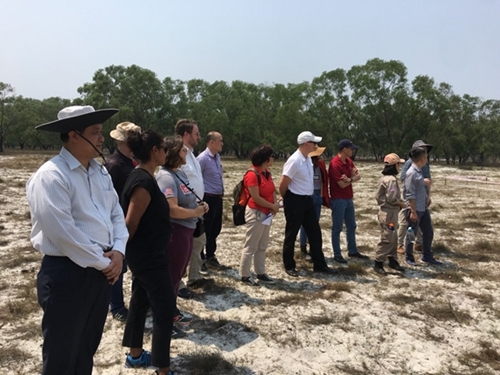Today, as the Chair of the UN Security Council, Vietnam will host a virtual ministerial meeting entitled “Maintenance of international peace and security: Mine action and sustaining peace: Stronger partnerships for better delivery.”
The theme of the meeting is also one of Vietnam’s priorities when it assumes the Chairmanship of the UN Security Council in April 2021.
On this occasion, Deputy Director of the Vietnam National Mine Action Center (VNMAC) Senior Colonel Nguyen Van Nghiep granted an interview to reporters of the People’s Army Newspaper.
    |
 |
|
Representatives of the VNMAC and embassies of the U.S., the U.K., Japan and the Republic of Korea making a field trip to the central provinces of Quang Binh and Quang Tri from March 29-31 |
Reporter: How has Vietnam promoted international cooperation in overcoming the aftermath of war-left bombs and mines in the country over the past years?
Senior Colonel Nghiep: Our country has experienced a number of wars, including national liberation wars and national protection wars. One can easily see heavy consequences of war in every corner across the country. For that reason, overcoming the aftermath of war-left bombs, mines and explosives is considered a long-time, money-consuming and labor-extensive job. In fact, Vietnam has mobilized its maximum efforts and resources to deal with unexploded ordnance (UXO) over the past decades but the results have been modest since as much as 18.82% of the territory is polluted with UXO, according to official statistics.
In recent years, our country has received much support from governments of other countries and international organizations. The countries that have provided considerable support for our country’s effort to deal with UXO include the U.S., the U.K., Japan and the Republic of Korea. Most domestic and international resources and efforts have been invested in Central Vietnam, the worst UXO-polluted region. Resources have also been used to support victims of war-left bombs and mines, public education about the danger of UXO, and UXO clearance.
Vietnam has also received support from international organizations, including The International Center (IC), The Norwegian People’s Aid (NPA), The Mines Advisory Group (MAG), The Peace Trees and so on. Apart from joining Vietnam’s mine action efforts, these organizations have also given livelihoods to people living in UXO-polluted areas.
Reporter: What role does the VNMAC play in boosting international cooperation in overcoming UXO in the country?
Senior Colonel Nghiep: The great support of foreign countries and international organizations for Vietnam has resulted from the concerted effort of relevant Vietnamese agencies, including VNMAC, to expand international cooperation in overcoming UXO consequences over the past years.
We have participated in international forums on war legacy and hosted seminars to introduce the National Action Program for the Settlement of Bomb and Mine Consequences (Program 504).
The VNMAC frequently cooperates with embassies of the U.S., the U.K., Japan and Republic of Korea in Vietnam to make field trips to Central Vietnam to inspect their sponsored UXO clearing projects and public education programs on UXO prevention.
The VNMAC is an agency specializing in bombs, mines and explosives under the National Steering Board on Overcoming War Legacy (UXO and toxic chemicals). It is responsible for coordinating cooperation activities in overcoming consequences of UXO left over by the wars. The center’s responsibilities also range from assessing the real UXO situation in Vietnam to directly implementing UXO clearance projects and UXO victim support programs.
Since the inception of VNMAC, governments of the U.S., the U.K., Japan and Republic of Korea have funded UXO cooperation projects in Vietnam via the center. So the VNMAC functions as the manager of international cooperation projects related to UXO.
With its high sense of responsibility, the VNMAC has effectively managed all international cooperation projects, particularly the international cooperation project to survey UXO-pollution in the six central provinces and Vietnam-Republic of Korea cooperation project to overcome war legacy in the two central provinces of Quang Binh and Binh Dinh. VNMAC’s effective management of international cooperation projects has given international partners confidence to further invest in UXO clearance projects in the country.
Reporter: How have relevant Vietnamese agencies coordinated over the past time to expand international cooperation in settling UXO in the country?
Senior Colonel Nghiep: Over the past years, Vietnamese agencies and organizations have effectively expanded cooperation with international partners in removing UXO. Particularly, the Ministry of National Defense and Ministry of Foreign Affairs have effectively coordinated in organizing international forums and events to introduce Program 504 to other countries and international organizations. Meanwhile, the Ministry of National Defense and the Ministry of Labor, Invalids and Social Affairs have closely collaborated with each other in supporting victims of bombs and mines. Other Central-level agencies, ministries and localities have also cooperated in various successful projects to support victims of war legacy. VNMAC has always served as the coordinator for cooperation projects related to UXO between/among domestic partners.
But the settlement of consequences of UXO left over by the wars is time and money consuming as I mentioned earlier. Domestic resources fall short when it comes to dealing with the real UXO situation in the country. In this circumstance, international cooperation and support from foreign countries and international organizations over the past time are highly appreciated.
The successes in realizing international cooperation projects related to UXO between Vietnam and some foreign countries and international cooperation will hopefully be a lever for other countries and international organizations to join the Vietnamese Government and people’s effort in settling a huge volume of UXO in the country in the future.
I think international cooperation in the coming time should focus on managing the national data on UXO, improving the efficiency of UXO clearance projects, and intensifying public education programs on preventing UXO accidents in central provinces.
Reporter: Thank you!
Translated by Thu Nguyen